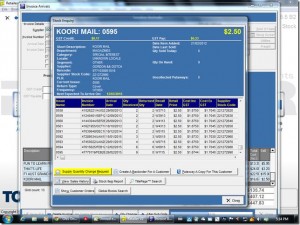With participating magazine publishers and distributors getting closer to trialling their proposed code of conduct, I am publishing here today what I publisherd here in November last year as I think the code of conduct is unfair on newsagents. I’ve made it clear I do not want to be part of a trial under this code as it is far too one-sided, it does not address the core magazine supply issues newsagents face.
Magazine Publishers Australia and representatives of Pacific Magazines, Bauer Media, Network Services and Gordon an Gotch have been working on a possible code opt conduct for the supply of magazines to newsagents. This work was initiated by the publishers and has been in discussion for a year.
Any code is a complex process because it must have approval from the ACCC. Even the suppliers talking together requires ACCC approval.
As I have written here many times, a code is essential for the competitiveness of newsagents. Most recently, on August 30, I published my suggested magazine supply KPIs – these were first presented to publishers at a breakfast meeting in 2005.
Newsagents need to be part of the discussion of any possible code of conduct. Here is a draft of the MPA code of conduct. It may not be a current draft. I am not positing it here as a declaration of what will be put in place. No, I am publishing it here so newsagents can comment more generally on the topic of KPIs.
If you compare this code of conduct to my suggested magazine supply KPIs you will see the MPA draft is biased to serve the publisher whereas mine is biased to serve the newsagent. I think the MPA code needs some more work but it is a start. For example, the financial viability of a title in a newsagency has nothing to do with the size of the print run … the ideal sales efficiency has nothing to do with the size of a print run.
I’d also note: early returns are essential to cash-flow management in newsagencies. If Network and Gotch want to be paid they must allow early returns. If a title has not sold in two weeks it ought to be a reasonable candidate for early return.
Publishers and distributors need to understand that delayed billing is of little benefit to newsagents.
Since we carry the space, labour and financial obligation, we need a supply model that allows us to take on such obligations.
Here is a draft of what the MPA has been discussing:
1. Minimum Sales Efficiency
A Distributor will ensure that no Title has a Sales Efficiency of less than the minimum Sales Efficiency set out in the table below.
Distribution quantity per Issue Minimum Sales Efficiency
>..30,000 copies 55%
20,000 copies – 30,000 copies 50%
10,000 copies – 20,000 copies 45%
1,000 copies – 10,000 copies 35%
< 1,000 copies 25%
2. Consecutive Nil Sales
A Distributor will cease to distribute a Title to a Retailer for a minimum of 12 months if the Title has experienced consecutive nil sales at that Retailer for, in the case of:
a) a weekly Title, six consecutive Issues;
b) a fortnightly or monthly Title, four consecutive Issues; and
c) any other Titles, two consecutive Issues.
3. Returns
A Distributor will not require Retailers to provide Full Copy Returns, except in relation to Partworks.
A Distributor may require that Retailers provide, at the Retailers’ expense, Mastheads as evidence of unsold copies of an Issue and may require that Retailers:
a) package such Mastheads separately from any permitted Full Copy Returns; and
b) clearly mark packages containing Mastheads or Full Copy Returns as ‘Mastheads’ or ‘Full Copy Returns’, as applicable.
4. Early Returns
A Distributor will not be required to accept Early Returns from Retailers, except where such Early Return is made by a Retailer to correct an error in allocations quantity.
5. Redistributions – Packs & singles
A Distributor will not Redistribute an Issue on more than once occasion.
If a Distributor Redistributes an Issue, the Distributor will ensure that:
a) the prior distribution of the Issue has Closed;
b) at the date of the Redistribution, less than 12 months has elapsed since the Recall Date applicable to the first distribution of the Issue;
c) the number of copies of the Issue provided to a Retailer is less than the number of copies provided to that Retailer as part of the first distribution of the Issue (unless the first distribution of the Issue was a sell-out at that Retailer); and
d) the On-sale Period for the Redistributed copies of the Issue is no more than three months.
If a Distributor Redistributes an Issue, the Distributor will use reasonable endeavours to ensure that:
a) the Issue does containing cover offers that have expired; and
b) if the Issue is bagged and no current Issue is included (e.g. a “Value Pack” of two old Issues), this is clearly communicated to consumers on the packaging.
6. New Titles
For each launch of a New Title, a Distributor will ensure that:
a) each Retailer receives notification of the launch prior to the On-sale Date for the Launch Issue; and
b) the number of copies of the Launch Issue distributed to each Retailer is determined reasonably having regard to the total print run of the Launch Issue and the average sales of 1 or more equivalent Titles (provided that a Distributor may distribute at least 2 copies of the Launch Issue to each Retailer).
For Issues of a New Title subsequent to the Launch Issue, a Distributor will, to the extent such data is available, use EDI sales data to determine the appropriate number of copies of those Issues to be distributed to each Retailer until a regular sales pattern for the New Title is established.
7. Maximum shelf life
A Distributor will ensure that the On-sale Period for an Issue does not exceed twelve weeks unless at least two of the following are applied to the Issue:
a) delayed billing, being the process by which …;
b) Retailers are offered an extra sales margin for sales of the Issue on top of the standard sales margin normally paid by that Distributor to Retailers; and
c) Split Deliveries.
8. Split Deliveries
A Distributor may utilise Split Deliveries for an Issue.
If a Distributor utilises Split Deliveries, the Distributor will ensure that:
a) to the extent such data is available, the Distributor uses EDI sales data to determine the appropriate number of copies of the Issue to be delivered to each Retailer for the second or subsequent deliveries; and
b) based on the rate of sales, if a Retailer has sufficient copies of the Issue available for sale to consumers, then a second or subsequent delivery should does not occur.
Here are definitions from the Code which could be useful reading this:
Closed means, in relation to an Issue, ….
Code means this Distributor Code of Conduct.
Distributor means a person engaged in the business of distribution of Titles and who is a signatory to this Code.
Early Returns means the return of a copy of an Issue, in the case of:
- a weekly, fortnightly or monthly Title, during the On-sale Period; and
- any other Title, Returned within 30 days from the On-sale Date.
Full Copy Returns means:
- the process by which a Retailer returns an entire copy of an Issue to the Distributor; or
- the entire copy of the returned Issue,
as the context requires.
Issue means an issue of a Title.
Launch Issue means the first issue of a New Title.
Mastheads means headers, the front cover or the barcode of a copy of an Issue that have been excised from the copy of the Issue.
New Title means any Title that is distributed under a Product Code that has not previously been used.
On-sale Date means, in respect of an Issue, the date, determined by the relevant Distributor, on which the Issue is first made available for sale to consumers by Retailers.
On-sale Period means, in respect of an Issue, the period commencing on On-sale Date and ending on the Recall Date.
Partwork means ….
Product Code means ….
Recall Date means, in respect of an Issue, the date, determined by the relevant Distributor, on which the Issue is required to be withdrawn from sale to consumers by Retailers.
Redistribute means the distribution to Retailers of an Issue that has previously distributed and recalled (using refurbished Full Copy Returns or mint copies of the Issue).
Retailer means a newsagency, supermarket, convenience store or other retailer to which Titles are delivered by a Distributor as a regular distribution channel.
Sales Efficiency means the total number of copies of an Issue sold by Retailers expressed as a percentage of the total number of copies of the Issue distributed to Retailers [averaged over, in the case of:
- a weekly Title, four consecutive Issues;
- a fortnightly or monthly Title, three consecutive Issues; and
- any other Title, two consecutive Issues.]
Split Deliveries means the distribution of an Issue by more than one delivery of copies of the Issue to Retailers during the On-sale Period.
Title means a magazine or similar periodical and, for the avoidance of doubt, excludes books.
 Unless I am missing something, this behaviour by Network Services would be permitted under the magazine supply rules the MPA has developed and the ANF endorsed: this magazine, SpongeBob and his Buddies, which failed at one newsagency in April 2014, has been sent to another newsagency. Unless it is a redistribution to the newsagency receiving it now, it’s a new title. But look at it … it’s been supplied in appalling condition. It’s a redistribution regardless of whether the newsagency receiving it had it previously. The stock sent out last week is not in mint condition.
Unless I am missing something, this behaviour by Network Services would be permitted under the magazine supply rules the MPA has developed and the ANF endorsed: this magazine, SpongeBob and his Buddies, which failed at one newsagency in April 2014, has been sent to another newsagency. Unless it is a redistribution to the newsagency receiving it now, it’s a new title. But look at it … it’s been supplied in appalling condition. It’s a redistribution regardless of whether the newsagency receiving it had it previously. The stock sent out last week is not in mint condition.











